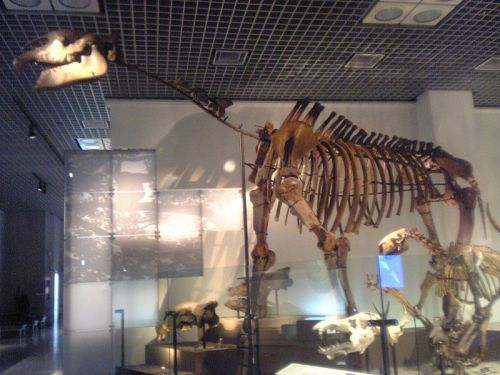Extinct Animals, Creation,
and the Worldwide Flood
Oddly enough, extinct animals provide one of the strongest Biblical arguments for evolution.
Here's why …
Extinct Animals, the Bible, and Science
There is controversy over evolution. There is controversy over a worldwide flood. But there is no controversy over extinct animals. Everyone, even young earth creationists, admit that many species—even thousands or millions of species—have gone extinct.
Nonetheless, animal extinction provides every bit as much problem for a literalist style of Bible interpretation as evolution does.
Think through this with me …

My daughter Leilani with a Sahelanthropus tchadensis skull at the Smithsonian. The little fellow's species has been extinct for several million years, and there's no mistaking that skull for either a human or chimpanzee skull. The issue on this page is not evolution, it's extinction.
Animal Extinction and the Flood
The very purpose of the ark was not only to preserve man, but also to preserve animals. Three times, God tells Noah that the reason two of every kind of animal would be coming to him was so that he would "keep them alive" (Gen. 6:19,20; 7:3).
If there was a worldwide flood around 4,500 years ago, and God wanted to preserve every species alive at the time, then why would he allow any to go extinct in just the last 4 millennia?
If it was worth preserving them through a worldwide flood, then why wouldn't he allow so many extinct animals due to an ice age or hunting by primitive man?
Even if we blame mankind for so many extinct animals in the modern age, we certainly can't blame man for the extinction of dinosaurs or the gigantic mammals that science says belong to the paleocene, eocene, and oligocene eras. We can't blame man for the extinction of saber-toothed tigers, nor for other extinct animals like trilobites and basilosaurus.

Indricotherium lived from the Eocene to the Oligocene epoch and weighed over 16 tons. It is the largest mammal that has ever lived.
Used with permission: Wikimedia Commons, by CooZone.
In other words, animal extinction—with or without evolution—is a real problem for the very literal Bible interpreter.
Extinct Animals and Literal Bible Interpretation
I'm a Christian. Despite how forcefully I present evidence—not just my opinion—for evolution, I don't want to stumble followers of Christ. I believe God created everything and that he has intervened in the history of the universe every bit as much as he intervenes in our lives today.
So why did God allow extinct animals? Why would he allow something that is such a problem to literal Bible chronology?
First, let's establish that extinct animals are not a problem to anything else. If evolution occurred, this does not in any way mean that God did not create the earth. The method God used to create life has nothing whatsoever to do with whether God did create life.
So I'd like to suggest that God's not interested in literal Bible interpretion and that literal Bible interpretation is not of any benefit to anyone. In fact, I found an 1800-year-old Christian argument that God himself put "incongruities and impossibilities" in the Bible specifically to lead us to a symbolic interpretation of the Scriptures.
Extinct Animals and a Regional Flood
I believe everything about the flood shouts regional. Everything in the Old Testament is about the Middle East.
You'll find nothing about China, and you'll certainly find nothing about ancient Indians in South America or the Aborigines of Australia.
As a result, you'll also find that kangaroos are never mentioned, nor are panda bears. Orangutans, opossums, and tigers … all missing.
The Old Testament is a regional set of books.
All-Inclusive Language
Yes, the Bible says that the waters of the flood covered the whole earth. However, it also says that Babylon ruled the whole earth.
Here's another excellent example of the Bible using all-inclusive language when it doesn't mean it.
In Psalm 14, the Scripture says, "There are none that do good; no, not one" (v. 3). Yet, in the very next verse these ones that don't do good "eat up my people like bread."
 My son Manuha with a Homo heidelbergensis skull at Smithsonian
My son Manuha with a Homo heidelbergensis skull at SmithsonianThat's just verse 4. In v. 5, God is with the generation of the righteous. In v. 6, he's the refuge of the poor that have been shamed by these people that don't do good.
Obviously, God didn't mean "no, not one." Instead, he meant, "It's exceptionally difficult to find anyone who does good in the general population."
After all, think about it. Psalm 14 was written by King David. Was there really no one at all doing good in the time of King David? The prophet Nathan wasn't righteous? His wife Abigail wasn't righteous? None of the thirty mighty men, nor the three above them were righteous?
Don't be surprised by this. God uses human language. When one of us comments, "everyone's a cynic," do we mean that everyone's a cynic?
Of course we don't. And if someone were to take us literally and argue that some individual is not a cynic and that your statement was wrong, you'd be irritated. I know people like that, who take everything literally. They are social rejects. The only reason anyone hangs out with them is to minister to them in Christian love.
Nonetheless, many Christians treat God that way. Personally, I think God is trying to minister to those people in love as well, but they're not getting it.
The Flood and Extinct Animals
If the flood is understood to be regional, then extinct animals are not a problem. The ark would have been needed only to keep local fauna from being destroyed without regard to animals that went extinct in the past.
Where to Go from Here
The purpose of a web page is to answer questions. I'm trying to guess what you are looking for when read an extinct animals page on an evolution versus creation web site. I hope that the information above has proven pertinent.
I really want to recommend the page on literal Bible interpretation. The argument this Christian gives, written 1800 years ago, is simply astounding. It's well thought out, cogent, and it lines up with Christian thought about the Scriptures in the 2nd and 3rd centuries.
For a more scientific discussion of extinct animals, you may want to try the dinosaur extinction page. And there's also a page addressing a science-Bible conflict where everyone, even young earth creationists, agree with science.